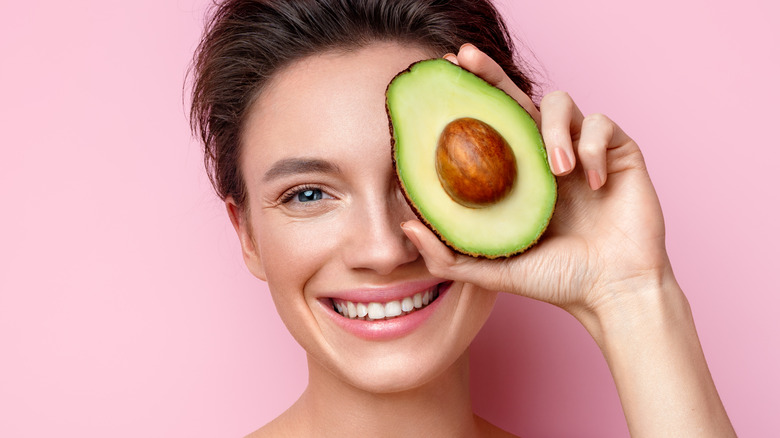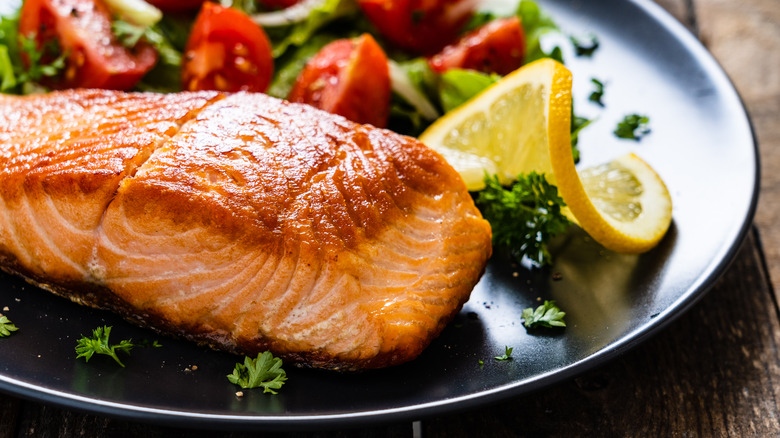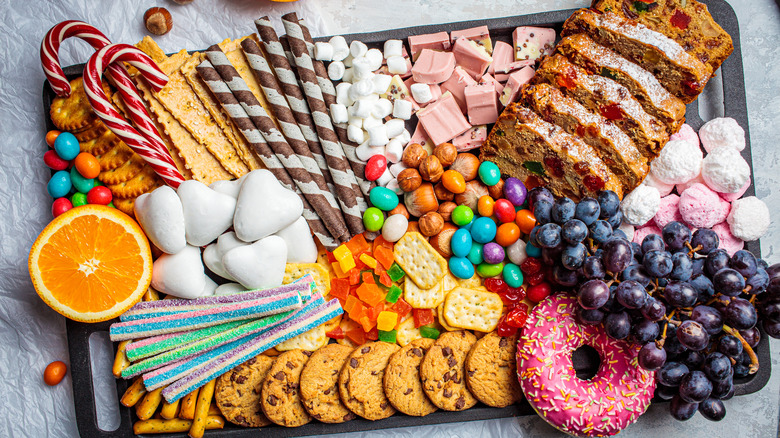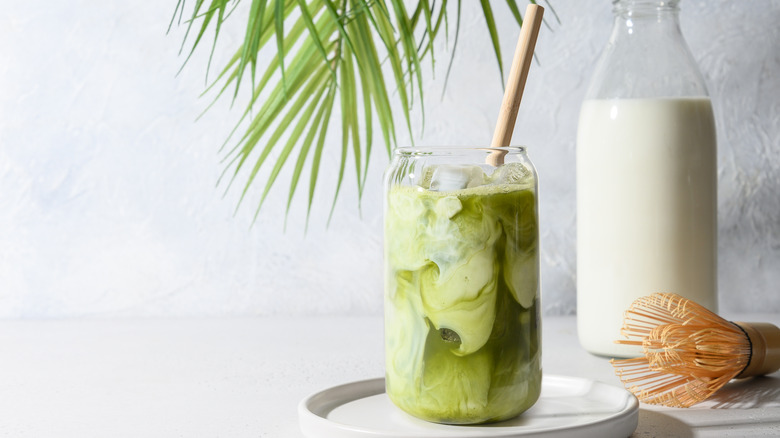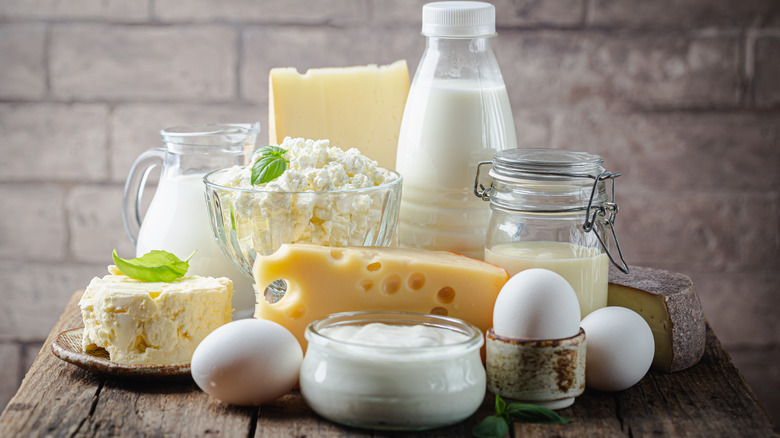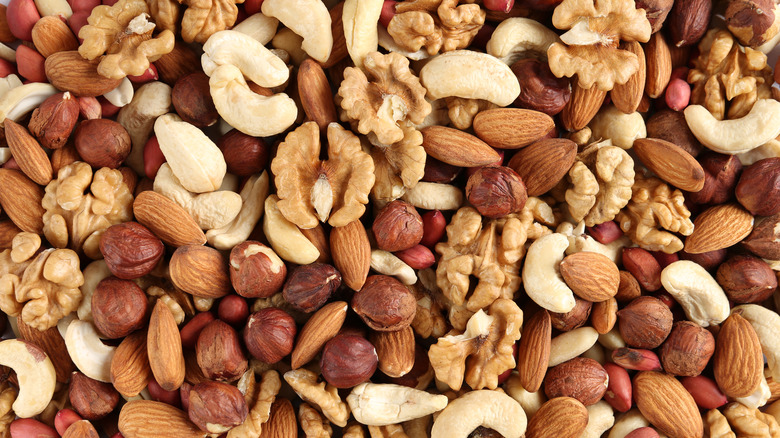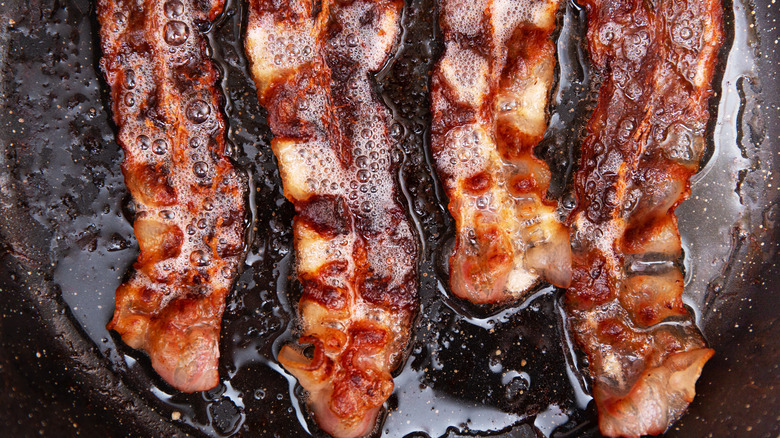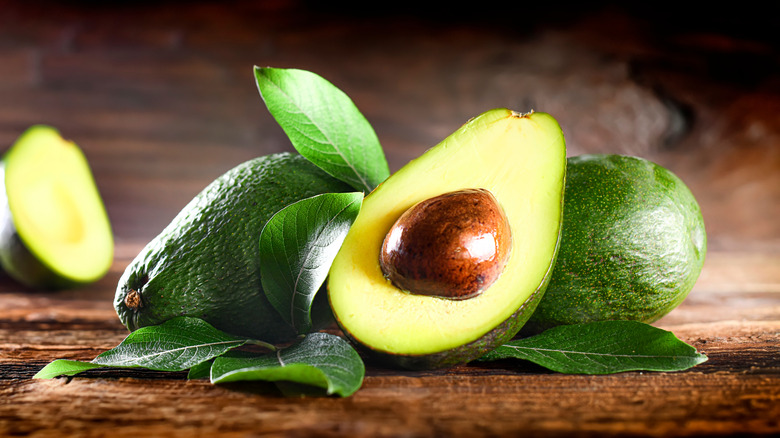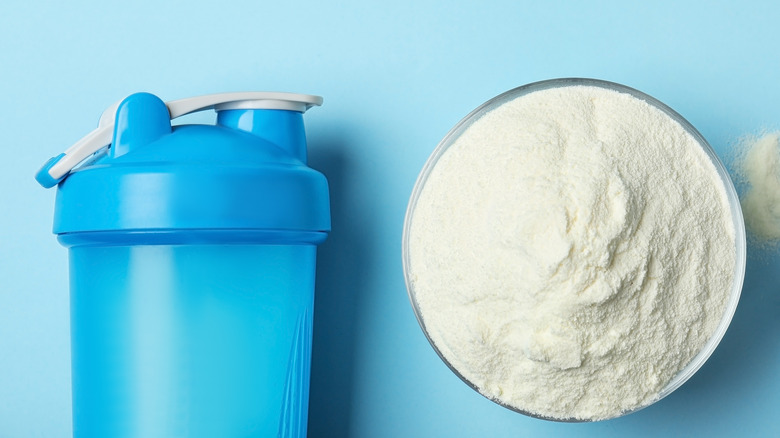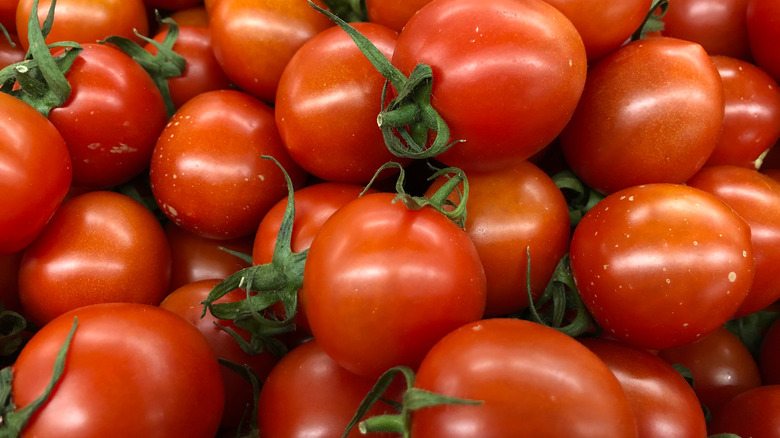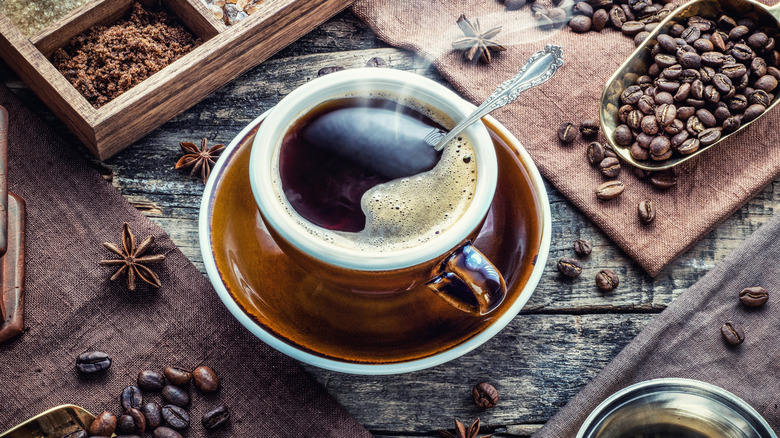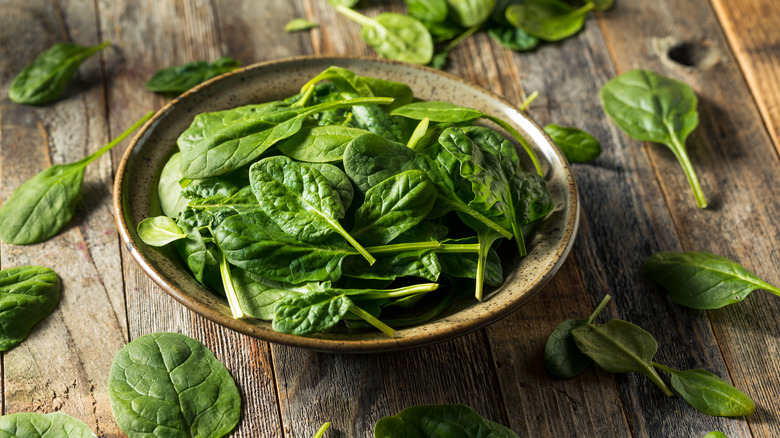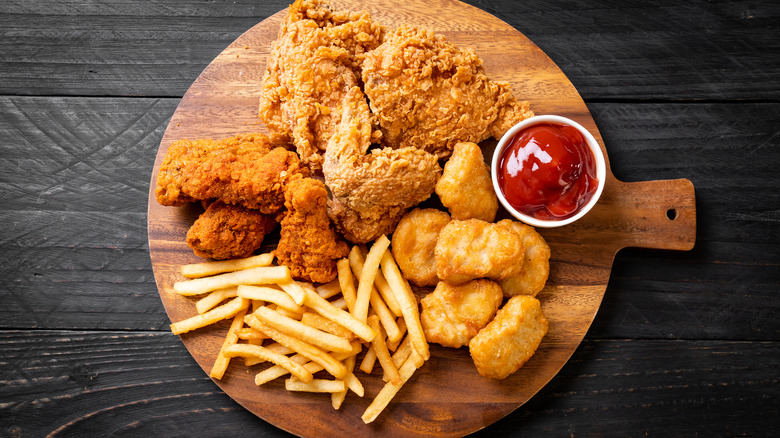7 Foods To Eat And 7 To Avoid For Better Skin
The foods you put in your body really do affect your health, both internally and externally (think: your skin). As nice as it would be to believe that you can eat all the fried, fatty foods as you want without experiencing any repercussions, it's simply not possible (via Healthline).
When you fail to consume the correct balance of vitamins, minerals, and macronutrients (fats, carbs, and proteins) to enable your body to function at peak capacity, you're setting yourself up for potential problems. Granted, these problems may not drastically interfere with your day-to-day life, but they could result in visible changes in your skin, nails, and hair, leaving you looking and feeling a little less dewy and glowing than you'd like.
Even though there are thousands of products on the market intended to give you the fresh, youthful skin of your dreams, a 2012 article in Dermatoendocrinology concluded that no product can really make up for the benefits of a good diet. "Fruit and vegetables consumption may represent the most healthy and safe method in order to maintain a balanced diet and youthful appearing skin," the study's authors concluded. But it's not just fruits and vegetables that make a difference. It's making healthier choices in all areas of your dietary intake, which also means leaving less healthy options behind.
Eat: Fatty fish
If you're not already including at least a couple servings of fatty fish in your diet each week (this includes options like salmon, mackerel, and herring), it's time to head to the fish market. High levels of omega-3 fatty acids, vitamin E, and zinc make fatty fish special — and especially good for your skin.
According to Healthline, these three nutrients together help prevent dry skin, keeping it moisturized and strong. Plus, they can help encourage regeneration of skin cells and reduce redness and inflammation. In fact, according to one 2016 study published in the Journal of Clinical Medicine, there's evidence to suggest that ingestion of omega-3 fatty acids could protect skin against the sun's UV rays, possibly reducing the occurrence of non-melanoma skin cancers.
So go ahead and stock your freezer with salmon filets and grill, bake, or pan-sear your favorite recipe two to three times a week. This is the recommended intake suggested by the American Heart Association. Plus, omega-3s are good for your heart health too.
Avoid: Refined sugar
The dangers of excess sugar consumption aren't exactly a secret. You've likely heard that consuming highly refined sugars has been linked to weight gain and a number of chronic health conditions, including type 2 diabetes, heart disease, and fatty liver disease (via Harvard Men's Health Watch). But the risks don't stop there.
Constantly consuming refined sugars and carbs — which are found in sodas, candies, cookies, and cakes, but also in other refined foods like breads, fruit drinks, yogurts, sauces, chips, and crackers — can wreak havoc on your skin too. New York City-based dermatologist Gary Goldenberg told Byrdie that refined sugars are "pro-inflammatory." And when someone consumes an excess of pro-inflammatory foods, they can exacerbate (although not necessarily cause) skin conditions like acne, rosacea, eczema, and psoriasis.
Does that mean you can't enjoy the occasional donut for breakfast or after-dinner ice cream cone? Of course not. The key here is to limit your intake. Pay attention to the types of foods you eat or drink on a daily basis. If you realize you're downing lots of soda or can't go a day without your mid-afternoon chocolate bar, it's likely time to talk to a dietitian about cleaning up your diet. Even using a food tracking app can help you identify sources of excess sugars. You may be surprised at which of the foods you're consuming that are leading to spikes in sugar consumption (FYI, those granola bars are not as healthy as you'd think).
Drink: Green tea
Okay so green tea is a not a "food," but you should add it to your "to drink" list as it's a wonderful, skin-healthy option (via Healthline). They key to green tea's benefits are in its polyphenols, according to Dr. Kaleroy Papantoniou, a cosmetic dermatologist. "Since green tea contains polyphenols, making it an antioxidant and an anti-inflammatory, it can be used as a great toner to treat acne," she told Eat This, Not That. This means green tea is not only good to consume, but use topically.
In addition to downing a glass in the morning, go ahead and use some on a cotton ball to apply to your face or any trouble spots. "The vitamin K in green tea helps lighten dark circles under the eyes, too," Papantoniou added, so you can even store your used green tea bags in the fridge to pull out for an under-eye treatment.
One thing to keep in mind when drinking your green tea, though, is to watch the additives. Certainly, add a dash of milk and a bit of honey if you can't take the somewhat bitter flavor straight, but avoid overloading your drink with too many fats and sugars. Remember, too much added sugar in your diet could limit the benefits of the good-for-you items you're consuming.
Avoid: Dairy
To be fair to dairy products like milk, cheese, ice cream, and yogurt, the jury is still out on whether or not they're directly linked to skin problems. Nevertheless, there appears to be a correlation between dairy consumption and acne. "We don't have enough data to know for sure, so we can only say it's a potential culprit," Dr. Ava Shamban, an assistant clinical professor of dermatology at UCLA, told Allure.
The issue is that many dairy foods (think: yogurt) tend to be high in sugars. So if you eliminate dairy, it's hard to know for sure if a change in your skin's appearance is due to cutting out the dairy, or reducing your sugar intake. That said, dairy also has another possible issue that could be linked to breakouts: added hormones. "The hormones cows are fed can be steroid analogues, which can make you break out," Shamban explained.
So if you tend to get more pimples than you'd like, it might be worth cutting down on your dairy consumption or, at least, choosing dairy products that are lower in sugar and come from cows that haven't been given hormones. Just remember, if you do cut out the dairy from your diet, you're also cutting out a source of calcium and vitamin D, so it's worth looking for other ways to make up the difference.
Eat: Ginger
Ginger, packed full of anti-inflammatories and antioxidants, is another one of those foods (spices, really) that's just generally good for you, inside and out. This is particularly true if you have skin conditions that are related to inflammation, like acne, psoriasis, or eczema. In fact, a chapter in "Herbal Medicine: Biomolecular and Clinical Aspects" points out that ginger also has "anticarcinogenic" properties that can even help play a role in preventing skin cancer.
These properties make it an excellent option to include in your morning tea or to add to your favorite stir fry recipe. Just remember, the benefits come from the root. Opting for fresh, minced, or ground ginger is generally best — don't just grab a bottle of ginger ale or a package of gingersnaps and assume you're going to get the same effect. Those added sugars aren't going to do your body any good. Also, if you're in the market for a skin treatment, it's worth looking for options that contain ginger. Topical application, in addition to ingestion, may have some benefits, as nutritionist Paula Simpson pointed out to Allure.
Avoid: Alcohol
As much as you love your nightly glass (or two) of wine, your alcohol habit isn't doing your skin any favors. For one thing, it dehydrates your skin. And when you want to maximize your youthful glow, alcohol's just going to suck your skin dry and make you look older. "[Alcohol] dehydrates your skin and will cause your wrinkles and pores to be more visible," Dr. Tess Mauricio, a board-certified dermatologist, told Insider.
These effects become even more pronounced in the winter months, when cold weather can further dry out your skin. "In cold weather it is important to avoid or minimize alcohol intake because it will tend to make you lose heat more readily from blood vessel dilation," Dr. Janet Prystowsky, a board-certified dermatologist in New York, told The Daily Meal. This loss of heat not only removes your skin of moisture, but it could even set you up for frostbite.
Eat: Nuts and seeds
Nuts and seeds are rich in selenium and vitamin E, which means they offer antioxidant benefits that protect the skin. In fact, according to the Skin Cancer Foundation, consuming higher levels of selenium in the diet can reduce cancer risk by 31% and reduce cancer-related death by 40%. Plus, chowing down on just two Brazil nuts per day can get you your daily allotment.
Vitamin E is also no sloucher. The Skin Cancer Foundation points to its role in absorbing energy from UV light and preventing damage from free radicals as two major skin-related benefits. And its anti-inflammatory effects may help maximize your skins protective properties, helping keep you safe.
Just mix up a handy trail mix with Brazil nuts, almonds, and sunflower seeds and keep it in your bag. When you're feeling hungry, you'll know your mid-afternoon pick-me-up is also adding nourishment and protection to your body's biggest organ: your skin.
Avoid: Meats with nitrates or nitrites
Nitrates are typically found in processed meats, like bacon and hot dogs, as a way to extend their shelf life, give them a salty flavor, and make them look more pink or reddish. According to Healthline, nitrates are a relatively stable compound that's unlikely to do harm on its own, but once they're ingested, they can be transformed into nitrites and form nitrosamines, a known carcinogen. The risk of these nitrates transforming into nitrosamines increases when processed meats are cooked at high heat, as is often the case with bacon, hot dogs, ham, and sausages.
And beyond it simply being inadvisable to voluntarily consume a lot of known carcinogens, nitrates and nitrites aren't particularly good for your skin. "These meats are high in nitrates and should be avoided, as nitrates can damage the skin by causing inflammation and wrinkles," Dr. Howard Sobel, an attending dermatologist and dermatologic surgeon at Lenox Hill Hospital in New York City, told Eat This, Not That. Plus, he pointed out, the high levels of sodium present in processed meats aren't going to do any favors for your skin's hydration level either.
Eat: Avocados
One place you really do want to maintain a healthy level of fat content is in your skin, which helps keep your skin flexible and moisturized, according to Healthline. But loading up on saturated fats found in cheese, butter, and fatty cuts of meat aren't the way to go. According to a 2010 article published in The British Journal of Nutrition, women who ate more green and yellow vegetables and less saturated fat had fewer wrinkles and improved skin elasticity.
Additionally, healthy fats, like those found in avocados, can deliver the good-for-you fats your body (and skin) need, while also offering a number of vitamins and minerals to maximize the food's benefits. Other skin-boosting nutrients you can receive from avocados include vitamin E and vitamin C, two antioxidants that work best when paired together (via Healthline). These can help protect your skin from UV rays and damage caused by normal oxidation.
Avoid: Whey protein
If you've been hitting the gym regularly, you may have bought into the hype that you need to maximize your gains by increasing your intake of protein — often achieved through supplements or processed foods with added whey protein. While the great protein debate rages on, questioning how much protein a person really needs and whether supplements are necessary, you might want to consider avoiding whey for your skin's sake.
"Whey protein consumed by bodybuilders has been associated with more acne breakouts," Dr. Yoram Harth, a board-certified dermatologist and the medical director of MDacne told Eat This, Not That. You see, whey protein causes the body to produce more insulin-like growth factor 1 (a hormone), which stimulates the production of sebum. Sebum is the wax-like substance produced by your sebaceous glands that contributes to oily skin. And oily skin? It's often related to acne breakouts.
The good news: If you're looking for other ways to boost your protein intake, there are lots of options available. Harth suggested trying vegan, plant-based protein powders when you're mixing up your protein drinks. And of course, lean cuts of meat, eggs, and fatty fish can help you increase your intake, too.
Eat: Tomatoes
If you're unfamiliar with lycopene, an antioxidant, just look at any of your favorite red, orange, or yellow-hued fruits or vegetables to understand where it's found (that means you can also get a dose in red peppers, watermelon, and papaya). The beauty of lycopene is that it helps prevents skin damage from the sun's UV rays (via Healthline). And in fact, it may even help reduce the risk of getting sunburn.
According to a 2001 study published in The Journal of Nutrition, study participants who were given a daily dose of tomato paste for 10 weeks before being exposed to UV rays had a 40% decrease in redness. Now, does that mean you can forgo sunscreen in favor of tomato consumption? Definitely not. What it does mean is that before you take a vacation to the beach, you should probably load up on both: a daily dose of tomatoes or other lycopene-rich produce (come on, they're good for you!) and your favorite sunblock.
Avoid: Coffee (in excess)
Before you get to worried about how you'll possibly get through your day without your morning pick-me-up, you can breathe a sigh of relief. Coffee, by itself, is unlikely to wreck your complexion. But it's certainly not going to do you any favors when it comes to your skin's hydration levels.
"Coffee acts as a diuretic," Ava Shamban, an assistant clinical professor of dermatology at UCLA, told Allure. "Our skin cells are made of water, and any time they shrivel up, you lose that glow and plumpness." This translates to the appearance of your skin, which means those pores and wrinkles you're trying to keep at bay are going to be more evident when your skin lacks its usual hydration.
That said, according to Shamban, it's a matter of balance. When you drink your coffee, simply make sure you rehydrate by matching your coffee intake with water. If you do, you may also benefit from the good-for-you polyphenols that coffee contains. Not to mention, your ability to function in day-to-day life.
Eat: Spinach and other leafy greens
Dark under eye circles are sometimes unavoidable. Whether you're nursing a new baby all night or you're burning the candle at both ends at work, sometimes your skin advertises your lack of sleep. When this happens, look no further than a daily spinach salad to help combat the effect. Leafy greens or other dark green veggies, including kale, collards, and even broccoli and Brussels sprouts, are rich in vitamin K, zinc, and zeaxanthin, which promote blood circulation and coagulation, prevent breakouts and inflammation, and even out skin tone, respectively (via Allure).
Under-eye circles are more apparent without proper circulation, according to Natasha Turner, a naturopathic doctor writing for Chatelaine. Thankfully, consuming enough vitamin K can help keep your under eyes looking a little bit lighter. And as Front Range Dermatologist Associates explained, "Spinach is [a] leafy vegetable rich in vitamin A, as well as iron, B vitamins, and omega-3 fats all believed to be beneficial for healthy hair, skin, and nails."
Avoid: Fried foods
If french fries, fried chicken, cheesesteaks, and jalapeño poppers are on your daily menu rotation, we can hardly blame you. There's no denying that fried foods taste good. But eating too many of these unhealthy fats can likewise leave your skin with an extra sheen.
"Deep fried foods lead to excess oil production within the skin," Dr. Rhonda Klein, a board-certified dermatologist, told The Daily Meal. Plus, many fried foods have an increased level of hydrogenated trans fats (those are the even more unhealthy fats that lead to worse trouble for your heart health), which Klein emphasized can have an undesirable effect on your skin's complexion.
Does that mean the instant you allow a french fry to touch your lips you'll end up with a breakout in the morning? Of course not. When it comes to eating for your health, whether it's your skin health, heart health, mental health, or athletic prowess, moderation is important. Enjoy the occasional fried indulgence, but also look for other ways to get your fix by learning to make baked versions of your favorite fried foods.

